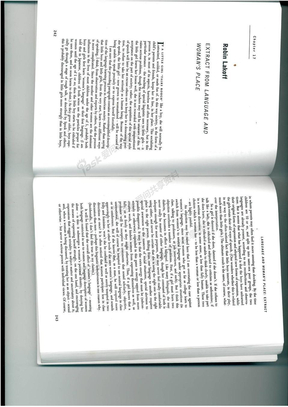

Lakoff's The Language War (2000) performs a linguistic analysis of discourse on contemporary issues. By not adhering to these maxims, a speaker is said to be "flouting the maxims." She stated that these are paramount in good interaction. These are: Don't impose, give the receiver options, and make the receiver feel good. Lakoff developed the "Politeness Principle," in which she devised three maxims that are usually followed in interaction. Speak in italics: Use tone to emphasise certain words, e.g., "so", "very", "quite".Indirect requests: "Wow, I'm so thirsty." – really asking for a drink.Hyper-correct grammar and pronunciation: Use of prestige grammar and clear articulation.

Tag questions: "You don't mind eating this, do you?".Apologize more: "I'm sorry, but I think that.".Super-polite forms: "Would you mind." ".if it's not too much to ask" "Is it okay if.?".
 Empty adjectives: "divine", "adorable", "gorgeous". Hedges: Phrases like "sort of", "kind of", "it seems like". Lakoff proposes that women's speech can be distinguished from that of men in a number of ways (part of gender deficit model), including: Her work is noted for its attention to class, power, and social justice in addition to gender. It has inspired many different strategies for studying language and gender, across national borders as well as across class and race lines. Lakoff's influential work Language and Woman's Place introduces to the field of sociolinguistics many ideas about women's language that are now often commonplace. Lakoff received national attention for an opinion piece in TIME titled "Hillary Clinton's Emailgate Is an Attack on Women". Lakoff is a regular contributor to the Huffington Post. During this time, as Chomsky and students were creating Transformational Generative Grammar, Lakoff and others explored ways in which outside context entered the structure of language. While an undergraduate at Radcliffe College (in Cambridge, MA), Lakoff audited Noam Chomsky's classes at the Massachusetts Institute of Technology (MIT), and became connected to the MIT Linguistics Department. She taught at University of California, Berkeley from 1972 until her retirement. She was married to linguist George Lakoff. in linguistics from Harvard University (1967). Lakoff was born in 1942 in Brooklyn, New York. Her 1975 book Language and Woman's Place is often credited for making language and gender a major debate in linguistics and other disciplines. Robin Tolmach Lakoff ( / ˈ l eɪ k ɒ f/ born November 27, 1942) is a professor emerita of linguistics at the University of California, Berkeley.
Empty adjectives: "divine", "adorable", "gorgeous". Hedges: Phrases like "sort of", "kind of", "it seems like". Lakoff proposes that women's speech can be distinguished from that of men in a number of ways (part of gender deficit model), including: Her work is noted for its attention to class, power, and social justice in addition to gender. It has inspired many different strategies for studying language and gender, across national borders as well as across class and race lines. Lakoff's influential work Language and Woman's Place introduces to the field of sociolinguistics many ideas about women's language that are now often commonplace. Lakoff received national attention for an opinion piece in TIME titled "Hillary Clinton's Emailgate Is an Attack on Women". Lakoff is a regular contributor to the Huffington Post. During this time, as Chomsky and students were creating Transformational Generative Grammar, Lakoff and others explored ways in which outside context entered the structure of language. While an undergraduate at Radcliffe College (in Cambridge, MA), Lakoff audited Noam Chomsky's classes at the Massachusetts Institute of Technology (MIT), and became connected to the MIT Linguistics Department. She taught at University of California, Berkeley from 1972 until her retirement. She was married to linguist George Lakoff. in linguistics from Harvard University (1967). Lakoff was born in 1942 in Brooklyn, New York. Her 1975 book Language and Woman's Place is often credited for making language and gender a major debate in linguistics and other disciplines. Robin Tolmach Lakoff ( / ˈ l eɪ k ɒ f/ born November 27, 1942) is a professor emerita of linguistics at the University of California, Berkeley.







 0 kommentar(er)
0 kommentar(er)
